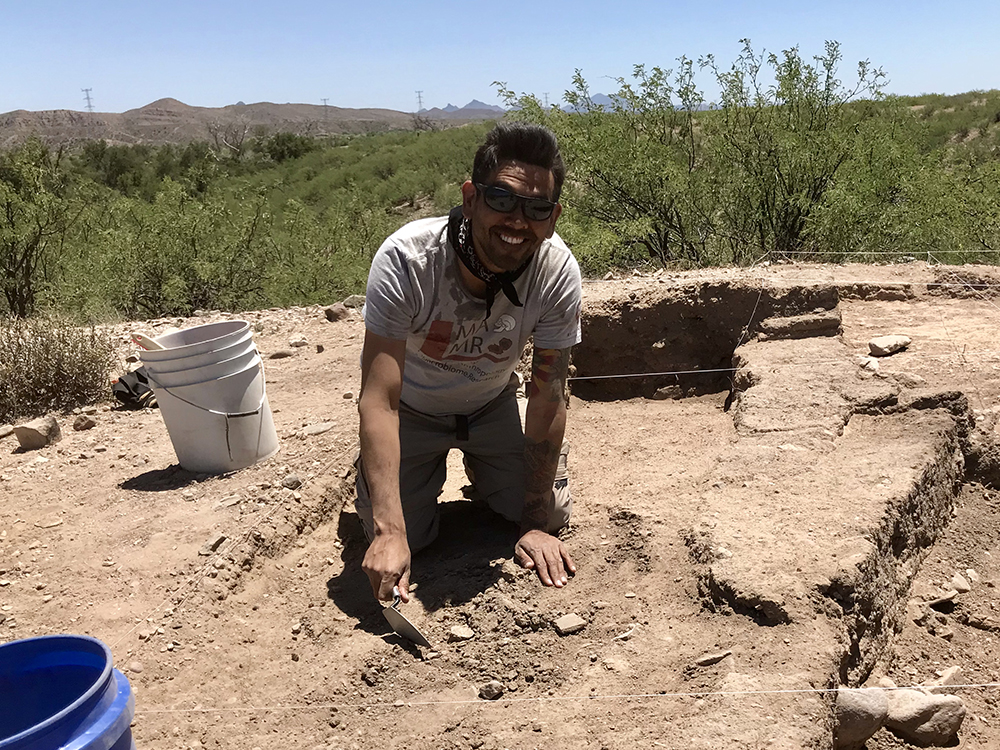*Editor’s Note: The “Views from NAU” blog series highlights the thoughts of different people affiliated with NAU, including faculty members sharing opinions or research in their areas of expertise. The views expressed reflect the authors’ own personal perspectives.
By Justin Lund
Dr. Justin Lund (Diné) is an Indigenous anthropologist and a postdoctoral scholar in the Department of Anthropology. In Spring 2023, he is teaching a class called The Anthropology of Star Trek. Follow him on Twitter @anthro_justino.
Boldly go into a world full of exploration, encountering new cultures while reflecting on what it means to be human. The stories and characters of the Star Trek franchises have been doing just that for nearly 60 years, and now NAU students can also do that in a new anthropology topics course titled The Anthropology of Star Trek. Come along and explore this idyllic future and what it may say about our present.
Experience has taught me that the fictional Star Trek universe is often cited to illustrate ideas and practices of anthropology. Simply defined, anthropology is the study of humans. Anthropologists employ a number of practices to understand ancient humans, human cultures, human health, human language and now human futures! In this class, we attempt to understand how U.S. culture is reflected in our creations of the future. The Anthro of ST challenges students to use the Star Trek “texts” to explore how present-day and past concerns of society and science are presented to public audiences. Star Trek’s longevity provides ample content for students to analyze and compare recent changes in social dynamics that have become entangled in an idealized on-screen universe. The franchises present a mythos for human existence, a dream for our future. And like any dream, there are often traces of ourselves woven into that story. As a space for present-day anthropological focus, Star Trek represents a collection of narratives, vetted by the public, that expose society’s concerns and interest in language, culture, exploration and science.
My name is Justin Lund, and I am an inclusive academic excellence postdoctoral scholar. My research focus is understanding genomics and Native American health. As a Navajo man, the potential benefits and current issues of genomics in Indian Country are very important to me. The important work that I do undoubtedly will continue here at NAU. If you surveyed a sample of scientists, however, you may find that many of us discovered our interest in science through science fiction like Star Trek. In the 1960s, Star Trek pushed the boundaries of what was acceptable to present to U.S. audiences. The show presented a future where women could work alongside men and where people of color held positions of authority, things that were intentionally not common in that day. As a young person, it was Star Trek: Voyager that inspired me to think about a Native man’s place in the future and consider what my own role as a scientist might be. Voyager’s Commander Chakotay was the first time I had ever seen a Native American man or woman in a scientific role. Often Natives are portrayed as things of nature, and this was perhaps one of the few times a Native American was spotted in the future. Science and Indigeneity are not often defined within the same realms of understanding … until now. The impact of representation cannot be understated. Star Trek has made every attempt to represent all people in the future. It’s no wonder the show is owed much credit for inspiring a generation of diverse scientists that we can all see today.
The Anthro of ST course uses Star Trek as a lens to present tangible examples of many anthropological issues. In fact, the show and certain characters were deeply tied to anthropology: Captain Picard fancied himself an archaeologist; Captain Janeway often commented on genomics; and Captain Sisko was entrenched in the culture and religion of another people. It became clear in 2017 with the premier of Star Trek: Discovery and the launch of a new era of Star Trek franchises that the Star Trek universe was not finished commenting on society and our ideal future. I was pleasantly greeted upon my arrival at NAU by the opportunity to teach this course at the 100-level as a topic under ANT 105: Anthropology Today: Global Issues. The ANT 105 courses are designed to give undergraduate anthropology majors a specialized topic to explore and provide non-anthropology students with examples of the diverse potential of anthropology to help us understand humanity and humanity’s challenges.
We hope the course entices new and old students of anthropology by allowing them to experience what it means to be an anthropologist. The field of anthropology tackles many human challenges through time and across space such as race and racism, colonialism, health and health disparities—just to name a few. These same issues are also being addressed through imaginations of our future. The Anthro of ST is a space where the seriousness of the world and the whimsy of the mind meet for a discussion of what it means to be human. During my time here at NAU, my hope is to inspire young minds to think about human existence in new and innovative ways, and with this course, I believe I accomplish some of that.
Search for ANT 105 and other unique and exciting courses in NAU’s course catalog.



